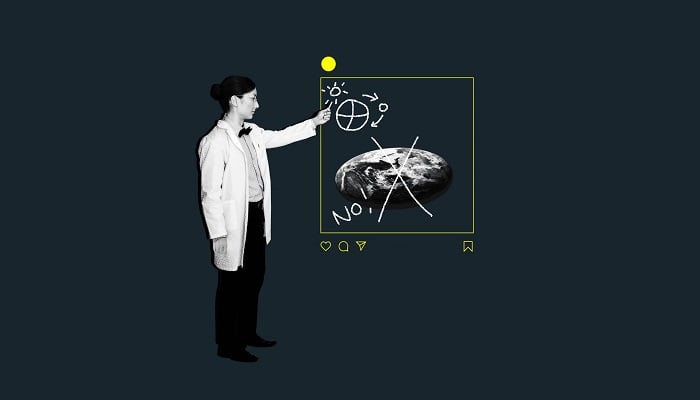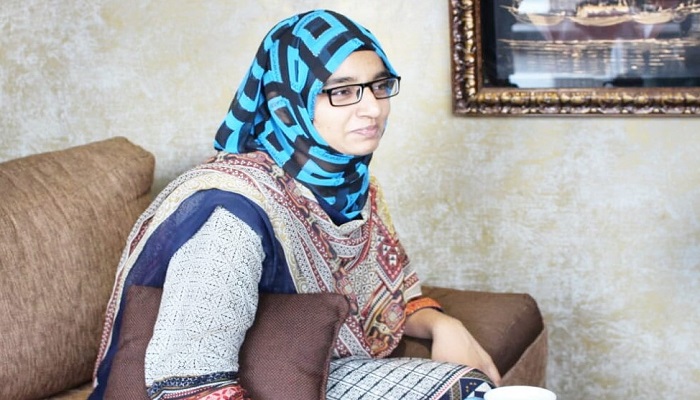Aspiring science journalists are battling coronavirus misinformation in Pakistan
Award-winning young students from across Pakistan collaborate to produce digital science magazine on virus
KARACHI: The novel coronavirus, which surfaced in a Chinese seafood and poultry market late last year, has now spread to more than 213 countries, killing at least 81,000 people and sickening close to two million in a matter of weeks. World health officials have declared the outbreak of the virus, which began in the city of Wuhan, a global health emergency.
All over the world, billions of people are under lockdown as governments scramble to contain the spread of the pandemic. Economic activity has ground to a halt, and medical research firms are racing to find a cure for the virus. The spread of the virus has been compared to World War II in terms of the impact it has had on the lives of people and the day-to-day running of governmental affairs.
Amid all this uncertainty, the world, as humanity knows it, is no more. The traditional avenues of help seem to be failing as the virus wreaks havoc without regard for wealth, religion, or politics. The feelings of anxiety as people are bombarded with bad news while locked inside their homes has led to a crisis of hope, compounded by the circulation of fake news and misinformation campaigns on the coronavirus.
Pakistan, like every other developing nation, has been hit particularly hard by this crisis. Since access to reliable and authentic sources of information on the virus is lacking, especially for people who do not read, write, or speak the English language, a vacuum has emerged that is more often than not filled by fake, unreliable and downright false messaging about the coronavirus outbreak.
To bridge this gap between science and journalism, a group of students from ten different universities across Pakistan have come together to collaborate on the publication of a digital magazine, published in several regional languages, that covers the coronavirus crisis from a purely scientific point of view, presenting facts, figures, and analysis on the pandemic from reliable medical experts.
Are pandemics drivers of evolutionary change?
In order to educate the masses, the magazine - named Scientia - also offers analysis on other virus-borne diseases that humans have fought and emerged victorious over through the centuries, including polio, hepatitis, influenza, the common cold, and small pox, to name a few. Through a sweeping cover story, the magazine elaborates on the evolutionary importance of pandemics, an idea that has received little media coverage.
The coronavirus edition of the magazine underlines how history can be an important guide in times of chaos. Pandemics generally force populations to either adapt, or go extinct, the cover story notes. "The constant battle between pandemic and humanity has long been recognized as a critical driver of social, moral, economic, and geographical changes that lead to human evolution," it claims.
Although this is a widely argued theory, scientists in the past have lacked the tools needed to test it. However, the presence of super-computers and big data analysis on viruses today reveals a great deal about the evolutionary impact of pandemics on living beings, specifically on humans and mammals.
Besides the intriguing cover story, the magazine also offers analysis on mathematical models that have predicted that the outbreak of the coronavirus can be contained within two or three months with lockdown measures across the world in place and people observing strict social distancing when venturing outside their homes for essentials.
The magazine, which is the first digital science publication to be offered in Sindhi, Punjabi, Balochi, Pashto, and Brahvi, also includes pieces on the myths surrounding the virus in Pakistan, the strategies Pakistan can adopt to manage a public health crisis, as well as interviews with leading academic experts on infectious diseases.
'Together we can make a difference'
Saadeqa Khan, the founder and Editor-in-Chief of the digital science magazine, is a freelance science journalist based in Quetta. She is the winner of the National Science Award 2019 for her beautiful Urdu translation of The Grand Design, a critically acclaimed work of late physicist Stephen Hawking.
Khan hopes to publish her second book, an Urdu translation of A Guide To Young Muslims by Nidhal Geussoum later this year. She is also beginning work on the Urdu translation of Astrophysics For People In A Hurry by renowned American scientist Neil De Grasse Tyson.
“I initiated Scientia in February 2019, with a handful of students. We aimed to make a difference together by providing a platform to the students willing to pursue an offbeat career in science journalism," Khan said while talking about the digital magazine and the idea behind it.
"There is a dire need for credible and research-based information. Such initiatives may help many people understand routine problems better and devise suitable strategies to deal with them," she added. "A prime example is the coronavirus pandemic," she noted.
"National and international news organizations face a severe problem in tackling the spread of fake news and myths. Governments and health professionals are having a hard time convincing and educating people about the severity of the situation with regard to the virus," Khan said.
"In order to battle this, we hope our magazine helps people understand that the pandemic is not a curse of the Almighty. Instead, it will eventually boil down an entirely new era of much better and sophisticated social and economic norms."
'Hopeful of positive impact on society'
Maham Maqsood, the managing editor of the magazine, is a student of Bio-Chemistry at the Quaid-e-Azam University in Islamabad. She is an aspiring science journalist. Maqsood is passionate about the health issues in the country and how society plays a part in fomenting them.
"For the magazine, we have interviewed several leading disease experts as to why the polio vaccine is still controversial in Pakistan and the problems associated with the vaccination of children whose parents are not particularly enthusiastic about the vaccine," Maqsood said.
"Although the ever-expanding internet is a prime source of information, one cannot neglect the importance of academic magazines. Scientia is striving to play its role in science journalism, and we are very hopeful of making a positive impact on society," she remarked.
'Nothing caters to curiosities better than science'
Khola Abid, a student at the University of Veterinary and Animal Sciences in Lahore, is a member of the editorial of the digital magazine. Abid is interested in exploring the role of data science in journalism, and feels that there is a huge market for such content in Pakistan.
“To me, nothing can cater the curiosities of a person than science and the contributions it has made to human knowledge. Science magazines can play a potent role in educating the masses. Editors must realize the importance of this endeavor," she said.
"As an editor, my aim is to teach couch-comfort authors that scientific knowledge is not a theorem of their misguided impulses and emotions. Rather, it demands to be disseminated with a passion for facts and figures. I am glad that I have an opportunity to do so," she added.
"Scientific knowledge has value only when it is shared with the general public in easy and straightforward terms. Scientists and researchers must come forward and use press and media to write articles in big newspapers," Abid urged.
'We want to spread scientific awareness'
Abdullah Khan, a student of Government College University in Lahore, who recently won an award in National Youth Policymaking, is also an editor at Scientia and an aspiring journalist who wants scientific knowledge to play a more central role in news media across Pakistan.
"I joined the team of this magazine to spread scientific awareness and bust myths that have plagued our society for generations. For the magazine, I have written about viruses and their enigmatic structures," Khan elaborated.
"There are four main ranks of coronavirus, named as alpha, beta, delta, and gamma. Most of these only effect animals, but a few can pass on down to humans and can be contagious. Health experts have repeatedly warned of the dangers associated with this," he said.
"Fake news becomes mainstream to a lack of professional science journalists in Pakistan. The government should provide reasonable resources to media houses to tackle this problem. The scientific communities should work on more science magazines," he maintained.
-
Security forces gun down 30 terrorists in multiple IBOs in KP: ISPR
-
MQM-P calls for new province in Sindh
-
US report validates Pakistan military edge over India: PM
-
Banned TTP poses serious threat to Pakistan security: UNSC panel
-
CM Afridi clarifies remarks on by-poll after ECP requests army deployment
-
Dubai sees 3.2m Pakistani passengers in 2025 as airport sets new milestone
-
Security forces kill 23 Indian proxy terrorists in KP's Kurram
-
Pakistan to construct island to boost oil exploration: report
















